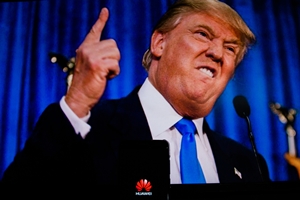Weaponizing the Word ‘Traitor’
Donald Trump’s traitor rhetoric isn’t just verbal aggression—it’s a strategic deflection. From generals and journalists to presidents and protestors, he’s turned accusations of betrayal into political weapons, repurposing patriotism as a loyalty test. But when we examine the record, from inciting insurrection to mishandling classified intelligence, another picture emerges: one of rhetorical projection and constitutional betrayal. This post explores how Trump’s language isn’t just provocative. It’s camouflage.
What Betrayal Really Looks Like: Trump’s Actions Under the Microscope
While Trump’s traitor rhetoric targets critics with theatrical fury, his own conduct reveals a deeper pattern of disloyalty – not to a person, but to the Constitution, democratic institutions and the American people. Below are key moments many view as betrayals in deed, not just word.
Click each heading below to reveal the facts behind Trump’s accusations, betrayals and the strategy of projection.
Inciting an Insurrection
Event: January 6, 2021
Details: Trump encouraged supporters to “fight like hell” and spread false claims of a stolen election. His silence during the Capitol breach and later justification of rioters drew bipartisan condemnation.
Why It Matters: Undermining the peaceful transfer of power is a grave breach of democratic norms.
Sources: House January 6th Committee report; live footage and public statements.
Withholding Military Aid for Political Gain
Event: Trump-Ukraine scandal, 2019
Details: Trump delayed congressionally approved aid to Ukraine while pressuring President Zelenskyy to announce investigations into Joe Biden.
Why It Matters: This quid pro quo led to his first impeachment for abuse of power.
Sources: Impeachment transcripts, call summary released by White House.
Praising Authoritarian Leaders
Event: Ongoing
Details: Trump has repeatedly praised figures like Kim Jong-un and Viktor Orban, embracing authoritarianism while attacking U.S. democratic institutions.
Why It Matters: Signals alignment with regimes that suppress dissent and undermine human rights.
Quotes: “He’s a tough cookie. He’s smart.” —Trump on Kim Jong-un.
Disparaging U.S. Troops
Event: Reported comments, 2018
Details: Trump allegedly called fallen American soldiers “suckers” and “losers.” Multiple officials corroborated the account.
Why It Matters: Disrespecting military sacrifice undermines the very people defending the country.
Sources: The Atlantic reporting; confirmation from former officials.
Mishandling Classified Documents
Event: DOJ indictment, 2023
Details: Trump was indicted under the Espionage Act for refusing to return classified documents, storing them haphazardly and obstructing efforts to recover them.
Why It Matters: These actions risk national security and violate laws meant to protect intelligence.
Sources: DOJ indictment filings; Mar-a-Lago search warrant.
Projection as Strategy
Overview: Trump’s frequent use of terms like “traitor,” “treason” and “enemy of the people” are strategic deflections. When facing credible accusations or political setbacks, he projects the very language of disloyalty onto opponents, muddying moral waters and reframing himself as the victim or patriot.
Mechanism: Accusing others of betrayal redirects attention from his own behavior. It collapses nuance into loyalty tests. If you criticize him, you betray the country. By conflating personal allegiance with national interest, Trump positions himself as the embodiment of America and dissent as treachery.
Examples:
- Calling General Milley a traitor deflected from scrutiny over Trump’s chaotic final days in office.
- Labeling journalists as treasonous shifted focus away from damaging revelations about classified documents and foreign ties.
- Accusing Obama and intelligence officials of “spying” served to recast legitimate investigations as personal sabotage.
Why It Matters: This tactic weaponizes patriotism, turning democratic critique into an act of betrayal. It erodes the idea that loyalty lies in upholding institutions, replacing it with fealty to a single figure. Projection becomes not just strategy, but survival.
Contextual Echo: This mirrors authoritarian playbooks worldwide: from Erdogan to Orban, labeling opposition as traitorous is a tool for consolidating power and silencing dissent.
Reflection: Reclaiming words like “traitor” requires restoring their meaning – to describe betrayal of public trust, not personal ego. In Trump’s rhetoric, projection isn’t denial. It’s camouflage.
What Real Loyalty Looks Like
Overview: True patriotism isn’t about defending power. It’s about defending principle. Loyalty to the Constitution, the rule of law and public welfare matters more than devotion to any single person or party. In a political climate distorted by personality cults and vengeance politics, real loyalty becomes a quiet act of courage.
Traits of Constitutional Loyalty:
- Speaking truth to power – even when it’s inconvenient.
- Upholding checks and balances and respecting institutional roles.
- Protecting whistleblowers and safeguarding the public’s right to know.
- Serving the public interest, not personal gain or partisan obsession.
Historical Parallels: Loyalty to country over ruler has defined many turning points in U.S. history from Watergate investigators refusing to back down to military leaders upholding their oath above politics.
Why It Matters Today: When loyalty is reframed as obedience to a person, democratic erosion follows. Real patriots ask hard questions. Real public servants stand between power and its misuse. And real loyalty sometimes looks like resistance.
Reclaiming the Word
To betray a country is not to challenge a president. It is to undermine its values, weaponize its laws and turn citizens against one another. Trump’s traitor rhetoric deflects from his own betrayal of public trust, a pattern that includes his ties to Jeffrey Epstein and raises further ethical questions. The most patriotic act is to hold power accountable – even when power screams “treason”.
Photo Credit: Image ID 149458597 © Ahmad Hafiz | Dreamstime.com
